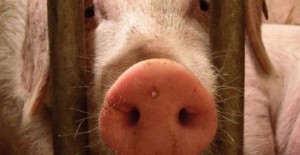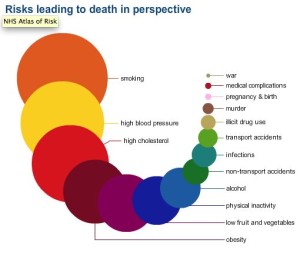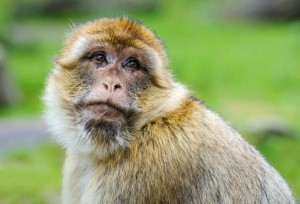Weltlog Woche 9 – 2015
Die Herkunft von Fleisch, das in Produkten wie Lasagne, Würstchen und Pizzen verarbeitet wurde, muss ab jetzt deutlich auf dem Etikett vermeldet werden. Hierfür plädierte unsere Partei im Europäischen Parlament und hat eine Mehrheit erreicht! Auf den Etiketten muss künftig der Geburtsort der im Produkt verarbeiteten Tiere vermeldet werden, der Ort wo das Tier aufgewachsen ist und wo es geschlachtet wurde. So ein Herkunftslabel gibt dem Verbraucher Einsicht und macht auch die vielen langen Tiertransporte erkennbar. Bei einem Kalb, das in den Niederlanden geboren und in Italien geschlachtet wurde, ist der lange Leidensweg, noch bevor es im Schlachthaus angekommen ist, sofort deutlich erkennbar. So bekommen Fleischesser die Möglichkeit „Nein“ zu den absurd langen Tiertransporten zu sagen und die Möglichkeit sich für lokale Produkte zu entscheiden wird erleichtert. Außerdem sorgt ein Herkunftsetikett dafür, dass der Betrug im Fleischhandel besser zurückverfolgt werden kann.
Letzte Woche machte auf Twitter eine Infografik, die Gesundheitsrisiken sichtbar macht, die Runde. Rauchen stand an erster Stelle der Liste der Todesursachen. Es war auffällig, dass Gesundheitsrisiken, wie Bluthochdruck, hohe Cholesterinwerte, Übergewicht und zu wenig Obst und Gemüse essen, eine viel höhere Punktzahl erreichen als zum Beispiel Verkehrsunfälle, Krieg und Drogenkonsum. Ich finde das sehr besorgniserregend, vor allem jetzt wo das Freihandelsabkommen TTIP droht in Kraft zu treten. Der Zweck dieses Freihandelsabkommens ist den Handel zwischen den Vereinigten Staaten und Europa zu vereinfachen. Damit droht der Import von ungesunden und verarbeiteten Lebensmitteln stark zuzunehmen. Das Institute for Agriculture and Trade Policy zeigt hier 10 Gründe auf warum das TTIP nicht gut ist für unsere Ernährung.
Der illegale Handel mir Berberaffen muss gestoppt werden! Jedes Jahr werden in Marokko schätzungsweise 200 Berberaffen gefangen, um in Europa als Haustiere verkauft zu werden. Das obwohl diese Affen vom Aussterben bedroht sind und als Haustiere völlig ungeeignet sind. So landen sie letztendlich in Tierheimen, die den Zustrom kaum bewältigen können. Wenn nichts unternommen wird, wird dieser so süß aussehende Affe, nach Schätzung der Experten innerhalb der nächsten 15 bis 20 Jahre ausgestorben sein. Die Partei für die Tiere fordert die Europäische Kommission dazu auf, europäische Länder zusammen arbeiten zu lassen und zu untersuchen, wie man den Handel mit Berberaffen in Angriff nehmen kann. Unser Aufruf findet zum Glück breite Unterstützung: Er wurde von Abgeordneten aller politischer Gruppierungen im Europäischen Parlament unterzeichnet.
Delphinariumbesitzer Aspro Parks wird der Tierquälerei verdächtigt. In diesem undercover gefilmten Video ist zu sehen wie ein Trainer einen Delphin vortwährend beschimpft und körperlich misshandelt. Delphinarien berauben den Tieren ihre Freiheit aus einem einzigen Grund: Sie Leuten vorzuführen und Kunststücke machen zu lassen. Der Lebensraum ist viel zu klein für ihr natürliches Verhalten des Wanderns durch den Ozean. Ernsthafte Gesundheitsprobleme, wie Aphatie und aggressives Verhalten, Stress, abnormales Sorgeverhalten von Müttern gegenüber Neugeborenen und ein geschwächtes Immunsystem, kommen bei Tieren im Delphinarium häufig vor. Ich finde es wird Zeit den Delphinarien eine neue Aufgabenstellung zu erteilen. Anstelle der Unterhaltung von Menschen, müsste die vorübergehende Pflege kranker und notleidender Wildtiere zentral stehen.
Interessant: auf dieser Infografik, von der Website des The Economist, ist zu erkennen wo der Großteil des Plastiks herkommt, welches unsere Ozeane verschmutzt.
Bis nächste Woche!
Gruß, Marianne
The origin of meat contained in products like lasagnes, hot dogs and pizzas must be clearly labelled. Our party advocated for this in the European Parliament and a majority voted in favour of it. The labels must contain the place of birth, of rearing and of slaughter of the animals contained in the product. Such label of origin will give transparency to customers and make the many, long animal transport visible. The fact that a piglet was born in the Netherlands and slaughtered in Italy immediately indicates that the piglet had to travel through hell to end up in the abattoir. This way, meat eaters are given the choice to say ‘no’ to outrageously long animal transports and it will be easier to choose regional products. Additionally, such label of origin will improve the traceability of meat fraud.
Last week an infographic was published on Twitter, which showed health risks in perspective. Smoking was top of the list of causes of death. It was striking to see that several health risks such as high blood pressure, high cholesterol, obesity and eating too little vegetables and fruit ranked much higher than matters like traffic accidents, war and drugs abuse. I find this very concerning, especially because the Free Trade Agreement TTIP is likely to be concluded. The objective of this free trade agreement is to make trade easier between the United States and Europe. This is likely to lead to an increase in the import of unhealthy, processed foods. The Institute for Agriculture and Trade Policy here lists the ten reasons why TTIP is bad for your food.
The illegal trade of Barbary macaques must be stopped! About 200 Barbary macaques are caught from the wild in Morroco each year to be sold in Europe as a pet, while they are threatened with extinction and they are completely unsuitable to be kept as a pet. They are frequently dumped at animal shelters, which can hardly deal with the flow of these apes. Experts are expecting that this cute looking small ape will be extinct within fifteen to twenty years if nothing is done to stop it. The Party for the Animals calls the European Commission to investigate with European countries how this illegal trade in Barbary macaques can be stopped. Fortunately, our call was widely supported: it was signed by the Members of Parliament of all political groups in the European Parliament.
Dolfinarium owner Aspro Parks is suspected of animal abuse. This undercover film shows how a trainer continues to shout at the dolphin and physically abuses it. Dolfinariums deprive animals of their freedom only for the purpose of showing them to humans and making them perform tricks. Their living environment is much too small for their natural migratory behaviour through the oceans. Serious welfare problems such as apathetic and aggressive behaviour, stress, abnormal maternal behaviour for newborns and lowered resistance are often found among animals in dolphinariums. I think that dolphinariums have to adopt a new objective. Instead of providing entertainment to humans, the temporary shelter of wildlife animals in need should be central.
Interesting fact: this infographic on the website of The Economist shows where most of the plastic polluting the oceans originally comes from.
Until next week!
Greetings, Marianne


